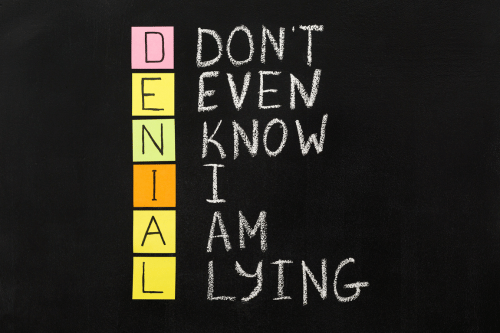12 Stages of Denial: Understanding Its Role in Grief and Addiction Recovery
Understanding Denial
Denial is a common defense mechanism that prevents individuals from accepting reality. It is often the first stage of grief, shielding individuals from intense emotions associated with loss or addiction. While denial can provide temporary relief, it can prolong the grief process and delay the recovery process for those struggling with substance use disorder or alcohol use disorder.
Definition of Denial
Denial occurs when a person refuses to acknowledge facts, emotional pain, or their own addictive behavior. This type of denial allows the mind to temporarily avoid difficult emotions, often leading to complications in the grief journey or stages of addiction recovery.
Why Denial Occurs
Denial is a natural response to overwhelming distress. When faced with the pain of loss, individuals may unconsciously reject reality to maintain emotional stability. This is especially true for those with dual diagnosis disorders, where mental health challenges complicate recovery from addictive drugs or alcohol use disorder.

The Grieving Process
Grief is a human experience that triggers a wide range of emotions. It does not follow a strict order, as individuals may revisit different stages of grief throughout their grief journey.
Overview of Grief Models
The most recognized model for grief is Kubler-Ross’s stages, which include:
- Denial stage – Initial shock and disbelief.
- Anger – Frustration and resentment.
- Bargaining stage – Seeking ways to reverse the loss.
- Depression – Deep sadness and feelings of emptiness.
- Acceptance – Coming to terms with reality.
Other models, such as Harvard Health Publishing’s research, highlight additional stages like anticipatory grief and complicated grief, which can further prolong the healing process.
Non-Linear Nature of Grief
People may cycle through different steps of grief unpredictably. The emotional journey is unique for each individual, with some experiencing absolute denial for extended periods.
Denial in Grief
Denial plays a major role in the stages of grief, particularly in the early phases. It manifests in different ways, including avoidance, emotional numbness, and disbelief.
Initial Shock and Disbelief
When faced with loss, people may experience intense emotions but struggle to process them. This stage of denial creates a mental barrier that prevents acceptance.
Emotional Numbness
Individuals in the denial stage may experience feelings of emptiness or detachment from reality. This is common in complicated grief, where avoidance becomes a long-term pattern.
Anger and Frustration
As denial weakens, emotions like anger and frustration emerge. The individual may feel resentment toward themselves, others, or the circumstances surrounding their response to loss.
Denial in Addiction Recovery
Denial is a significant barrier in the stages of addiction recovery. Many individuals refuse to admit they have a problem, preventing them from seeking help.
Recognizing Unawareness
An addicted person may justify their drug abuse or alcohol use disorder by blaming external factors. This addicted patient often minimizes the consequences of their actions, making it difficult for medical professionals to intervene.
Levels of Acknowledgment
Denial exists in different levels:
- Absolute denial – Rejecting any problem exists.
- Partial denial – Admitting some consequences but refusing full responsibility.
- Acknowledgment with resistance – Recognizing the issue but avoiding change.
Movement Toward Acceptance
Overcoming denial requires active participation in treatment programs such as drug rehab, 12-step groups, and individual therapy. Recovery starts when the person in recovery must recognize the impact of their addictive behavior.
The Interplay of Grief and Denial
Grief process and stages of denial often overlap, complicating healing for those struggling with substance abuse.
How Grief Complicates Denial
Grief can reinforce stages of addiction denial, making it difficult for a person to break free from drug addiction or alcohol use disorder. This often leads to dual diagnosis patients, where mental health issues and substance dependence occur simultaneously.
Case Studies of Grief and Denial
Real-life examples illustrate how grief process and denial interact:
- Case 1: A woman denies her spouse’s overdose, refusing to acknowledge their long-term substance abuse history.
- Case 2: A man in long-term recovery struggles with bargaining phase, convincing himself he can return to casual drinking despite his history of alcohol use disorder.

Coping with Denial in Grief and Addiction
Overcoming denial requires a combination of grief counseling, structured programs like 12-step recovery programs, and personal coping strategies.
Role of Grief Counseling
Grief counseling provides a safe space to navigate emotions of grief and confront denial. Mental health professionals help individuals break through their defense mechanisms and process their emotions.
Benefits of Professional Support
Seeking professional support can:
- Help individuals recognize denial and accept reality.
- Provide tools for handling emotional responses.
- Offer structured programs like 12-step interventions and 12-step meetings.
Strategies for Effective Counseling
Counseling approaches include:
- Cognitive Behavioral Therapy (CBT) – Helps patients recognize and change negative thought patterns.
- Motivational Interviewing (MI) – Encourages self-awareness and change.
- 12-step philosophy – Used in 12-step fellowship programs like Alcoholics Anonymous.
Developing Coping Strategies
Coping mechanisms can either support healing or reinforce denial.
Healthy vs. Unhealthy Coping Mechanisms
Healthy Coping Strategies:
- Engaging in 12-step groups like Alcoholic Anonymous.
- Seeking individual therapy or 12-step call interventions.
- Using spiritual awakening as a source of healing.
Unhealthy Coping Strategies:
- Using addictive drugs to suppress emotions.
- Isolating from social interaction and support networks.
- Avoiding conversations about the pain of loss.
Building Personal Resilience
Resilience helps individuals adapt to grief and recovery by:
- Acknowledging emotions rather than avoiding them.
- Participating in 12-step model programs for continued support.
- Seeking ongoing social behavior reintegration.
Importance of Support Systems
Support from 12-step fellowship, therapy, and loved ones plays a key role in overcoming denial.
Role of Friends and Family
Friends and family provide emotional support and accountability. Encouraging open conversations and expressing concern can help individuals break through denial.
Group Support and Community Resources
Programs like Alcoholics Anonymous, drug rehab, and 12-step recovery programs offer structured peer support. Online resources and mental health professionals can also guide individuals through their grief journey and stages of addiction recovery.
Conclusion
Denial is a common defense mechanism that affects both stages of grief and stages of addiction denial. Recognizing denial, seeking professional help, and participating in 12-step groups or therapy can help individuals move toward acceptance. Whether coping with the pain of loss or substance abuse, healing requires active participation and a strong support system.










